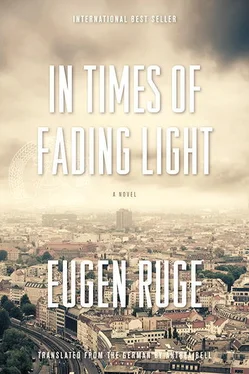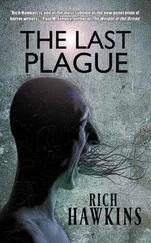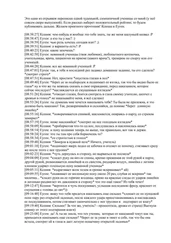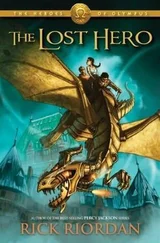He will be surprised to see the crescent moon hanging askew. He will look (usually without success) for constellations of stars tilted sideways.
When it is fully dark he will climb the steps to Eva & Tom at his leisure, to where the usual company, whose conversation is dominated by South German sounds, are sitting at the table on the terrace. They are all acquaintances of Eva the Indian, and they assemble here every year at this season: a gray-haired, chain-smoking man in a loose flowered shirt; a rather younger man with a bald head, who shares a room with the chain-smoker; a woman with a missing tooth in a dress printed with a homemade batik pattern; another man whom Alexander thinks of as Straw Hat, because he wears a decrepit straw hat at all times of the day, to suit his shabby, formerly white linen clothes; and a motorcyclist with several rings in one ear.
The biker (who will turn out later to be a staff council representative from a large German city hospital) has told Alexander that all of them except the bald man met here in the seventies, that Eva and Tom stayed on and gradually turned what had been a down-at-heel hotel for all comers into this guesthouse, and before he discovered from the biker that Tom died long ago, Alexander thought Tom was the man in the straw hat—maybe because he talks louder than anyone else, always about repairs and rebuilding of some kind, and regularly complains of the unreliability and indolence of the Mexicans.
“The only good Mexican is a dead Mexican,” he will say when Alexander comes up the steps to the terrace this evening, and the man in the loose flowered shirt will chuckle the way you chuckle at a joke that you could have told yourself, because you know it already, and his paunch will bob up and down under the loose flowered shirt.
It’s worst of all—worst of all?—at night, when I lie under my mosquito net and hear the voices of the aging hippies through the flimsy walls of my room as they sit outside telling each other their stories. I think of you then, in particular. Why just then? Because I feel excluded? Because I have a sense of not belonging? But always, all my life, I’ve had a sense of not belonging. Although all my life I’d have liked to belong somewhere, I have never found out what I’d have liked to belong to. Is that sick? Do I lack some kind of gene? Or is it to do with my story? The history of my family? If I’m to be honest, when I’m lying under my mosquito net nothing makes me want to go out to that table. And yet, when I hear them laughing, I feel an almost painful longing.
He will shake out his bedclothes, as advised by Eva. As he does so he will think of the scorpion that he saw on the terrace a few days ago. The scorpions here are not deadly, but almost the size of saucers—and astonishingly beautiful. He was so moved by its fragile structure that he was unable to tread on the creature. Eva did it, in her flip-flops. Since then, he thinks, she has despised him.
The voices will be audible for a long time this evening. The man in the loose flowered shirt will chuckle to his paunch. The straw hat will talk about the unreliability and indolence of the Mexicans. And sometime or other the woman with a missing tooth will take out a guitar and sing Joan Baez songs, and the others will join in, with genuine but destructive fervor.
Then at some point, late at night, there will be nothing to be heard but an occasional coughing fit from the man in the flowered shirt, and the chirping of a cricket, sounding like an alarm, and Alexander will lie under his mosquito net and write letters to Marion in his head:
Sometimes I think I ought not to write to you at all. That I ought simply to disappear from your life. That having made my own bed I must lie on it alone. Now that sickness has caught up with me, how can I want to get into bed with you? How can I think of longing for you now? And yet I do long for you, and the odd thing is that it’s not bad. I mean, yes, it is bad, but comforting at the same time. It’s comforting that you exist. It’s comforting to think of your thick black hair. Of the smell of the nape of your neck when I lie against your back. Or of the way you whimper with contentment when you’re half asleep.
Around seven thirty he will get up and ask the Mexican girl who is the only one scurrying around the kitchen at this time of day for coffee. He will sit on the terrace for a while, with the rather too hot cup in his hands, looking out at the new day and listening to his own breath, whispering back at him out of the hollow of the cup.
Or of the rustle of your underclothes when you are changing behind the wardrobe door. Or the way your mouth opens when you are excited.
A hummingbird will hover among the hibiscus flowers for a while, like a large insect. And farther up, in the morning sky, the black birds like vultures will circle.
Or of your muscles (which put mine to shame at first). Or of your stomach. Or of the palms of your hands, always slightly roughened from your work.
Then the first fishermen will appear on the huge, concrete surface of the landing stage, and for a moment Alexander’s mind will dwell on the question of why no one ever lands on that landing stage. As if, he will think, the little place wanted to defy its nickname of Puerto with this structure. As if it had hoped to lure the oceangoing ships with that grand name.
Or to think of fetching you from work. You in dungarees among the knee-high greenery, mopping the sweat from your brow with the back of your hand. Or your slow way of moving—did I ever tell you that?
Or the way you wrinkle your nose, going “Hmm.”
Or that sly gleam in your eyes.
Or—is it all right to say a thing like this?—or your face when you cry.
For a moment he will be tempted to write down what he is thinking—just in case he ever really writes that letter. But even going to find a pen and paper, even less than that, he will fear, might drive the mood away.
Yes, it’s comforting to be able to think of you like this, and sometimes I ask myself: is that, perhaps, enough? On the one hand it hurts to think that when you were close enough for me to touch, I neglected all of this. On the other hand I am making the strange discovery that one does not necessarily have to possess what one loves. On the one hand I am drawn to you to make up for what I failed to give. On the other hand, I am afraid that—after all I learn from medicine about my prognosis—I would still be only the taker, even more so than before. On the one hand I would like to write and tell you all this. On the other hand, I am afraid you will take it as a kind of proposal of marriage—and so it is.
When he has drunk his coffee, he will put on his running shoes and run a couple of kilometers. He bought the running shoes in Pochutla. At first he tried walking: like Kurt—he laughed when he caught himself thinking that his sickness might, like Kurt’s, become operable if he imitated Kurt’s lifestyle. But it soon turned out that this was not a great place for walking. The hinterland, as he had already seen from the taxi, was not alluring. Only the beach would have invited people to walk on it, if the separate bays were not divided from one another by impassable rocks. You can go from bay to bay only by road, and the road is boring. So he runs.
Today, as always, he will jog northward along the narrow, winding asphalt road, will take the rises at a leisurely pace so as not to drive his pulse too high, just enough to give him a feeling that he could run on like this forever.
Now and then cars will drive past. People sharing taxis will turn their heads to look at him. There are few pedestrians around here, and when he sees two men in the distance, coming toward him, he will instinctively wonder how, if they try mugging him, he can make them understand that he carries no more than twenty pesos on him.
Читать дальше












